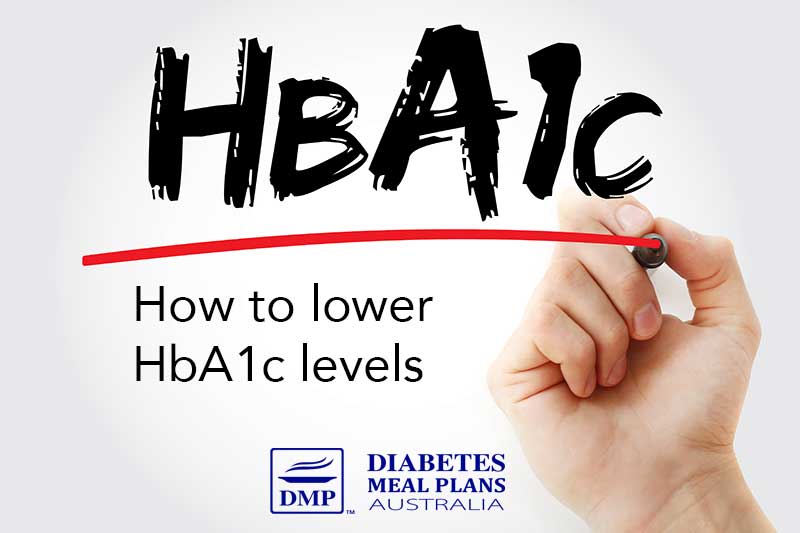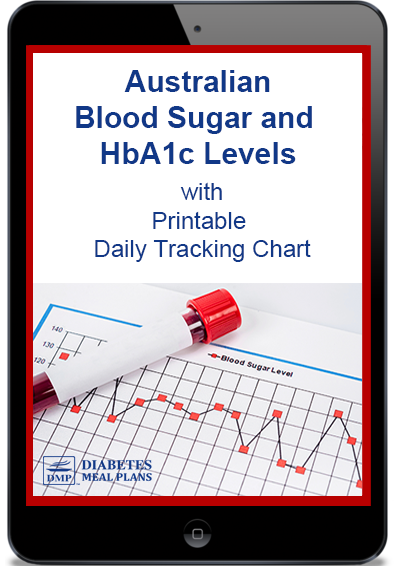Today’s reader question:
My HbA1c is high and I need help or suggestions to lower it. I’m feeling so frustrated, please help?!
Without a doubt, knowing how to reduce HbA1c is incredibly important to your health.
How important? Well, research shows that each 1% reduction in A1c may reduce your risk of:
- microvascular complications such as neuropathy and retinopathy by 37%
- heart attack by 14%
- diabetes-related death by 21%
By getting your HbA1c levels to a healthy normal range and keeping them there, you will stay in good health long term.
So, let’s talk about how to lower HbA1c?

What is HbA1c?
In short, HbA1c is a blood test that measures your average blood sugar levels over the past 3 months.
The important thing to understand here is what is raising the HbA1c level: it’s sugar/ carbohydrate in the bloodstream.
A process called glycosylation occurs where sugars (glucose) in your bloodstream attach to haemoglobin (the protein molecule in red blood cells). The average red blood cell lives for around 3 months, so when they do the HbA1c blood test they are testing ‘glycated haemoglobin’ or in other words, ‘sugar on the blood.’
If you want a downloadable copy of our blood sugar and HbA1c levels, with printable daily tracking chart, CLICK HERE to grab it.
How To Lower HbA1c?
Essentially you lower your HbA1c the same as you lower your blood glucose—through diet, exercise, and lifestyle, and with the help of medication if necessary.
Making diet changes is especially important. In fact, diet can lower HbA1c as much, if not more than diabetes medications.
Here are the most effective diet changes you can make to lower HbA1c.
Cut the carbohydrate foods
If it’s sugar/ carbs that attach to haemoglobin, then it makes sense to reduce the amount of carbohydrates you consume, right?
This is one of the fastest, easiest ways to get results – we know because our members are achieving amazing results with this one simple strategy.
“I wanted to see my HbA1c under 5.7 but my doctor told me that because of the medications I have to take, not to expect that to happen. I got great news today. My A1C is 5.8!! I am so grateful for DMP!” ~Val, Member
What carb foods are the big problems?
Reduce or eliminate bread, pasta, rice, potatoes, sweet potatoes, corn, noodles and grain-based foods like crackers and breakfast cereals, sugar and sugar-sweetened beverages. These foods contain very high amounts of carbohydrates compared to other foods.
Instead, focus on eating the right type of carbohydrates.
Eat nutrient dense whole foods
Processed foods are just junk and they don’t do your metabolism any favours.
The food philosophy we have here at DMP is to eat as natural as you can, eat whole foods that come directly from nature, as much as you can.
Fresh foods are ‘nutrient dense,’ which means they contain valuable vitamins, minerals and other nutritional components.
Eating nutrient dense whole foods is very important because it not only reduces blood sugar levels and HbA1c, but works on the inflammation and metabolic problems that your body has as well. The combination of reduced carbohydrates and a nutrient dense whole foods diet is better than just trying to reduce carbs but still choosing lots of low carb ‘products.’
Eat more vegetables
The key is to eat more vegetables, particularly the type of vegetables that grow above the ground, such as cucumber, lettuce, spinach, zucchini, tomato, green beans, Brussels sprout, cabbage, Asian greens, and the list goes on.
Vegetables contain fibre, minerals, vitamins, polyphenols, and compounds that help nourish the body and lower blood sugar, HbA1c and inflammation.
Instead of the high carb foods mentioned above, fill your plate with a big selection of fresh vegetables. Vegetables are carbohydrates but the good kind you can eat ample portions of.
In 6 weeks my HbA1c came down from 6.9 to 6.7. All my other labs came into normal range. My doctor is very pleased. Love the meal plans and foods. ~Kathy H, Member
Start slow
Cutting carbs is not an easy process for most people so often this means you have to start slow.
For example: If you drink soda, start there and cut that out. After that you can tackle sugar, and then things like bread, rice, potatoes, and pasta.
Basically you’ve got a 3 month window to change your HbA1c to a better result, so just take it one step at a time.
How will you know your HbA1c levels are going to be better?
You only have an HbA1c test every 3-6 months so how will you know if you’re going to get better results at your next test?
The best way is to monitor your daily blood sugar levels, before and after meals. You want to aim to reduce your daily blood sugar levels and this will be reflected in your HbA1c test.
Learn more about the normal blood sugar levels here.
Other Important Strategies That Help Lower HbA1c
- Exercise regularly – aim for a goal of 30 minutes a day but if you currently do nothing, then start with just 5 or 10 minutes and build up from there. Exercise helps the cells in the muscles use sugar from your blood more efficiently.
- Drink water – you need to drink plenty of water with diabetes, aim for at least 1.5 litres per day. Water can help regulate blood sugar levels.
- Live a healthy lifestyle – lowering HbA1c levels does take some commitment so this must come from within, a mindset change where you really put yourself a a priority, resist temptation, and focus on permanent changes.
- Keep a food diary – this will help you monitor what you eat, when you eat, and how you are feeling.
- Keep a cap on stress – stress bumps up blood sugars so don’t stress about your levels or anything else. Work in your circle of influence, meaning focus on what you CAN do and change, don’t focus on or worry about what you can’t change.
- Test, test, test – testing blood sugar levels regularly can help you identify how foods, life, and other things are affecting your body. Test before and after meals. If you do eat carbs, test before and after so you can actually see how different foods affect your blood sugar levels. This is called monitoring in pairs.
Key Points
HbA1c is a blood test that measures how much sugar/carbohydrate is on the blood
One tip to get the best results fastest: cut back the carbohydrate foods – bread, pasta, rice, potatoes, sweet potatoes, corn, noodles and grain-based foods like crackers and breakfast cereals, sugar and sugar-sweetened beverages. This in itself will result in dramatic changes to your HbA1c levels.
Focus on eating nutrient dense whole foods and lots of fresh vegetables.
Aim for a goal of 50-80 grams of carbs per day, or up to a maximum of 100 grams per day.
Be patient with yourself. Making diet and lifestyle changes is a process that often takes people time to achieve.
Other Helpful Resources:
Guide to Healthy Carbohydrates

